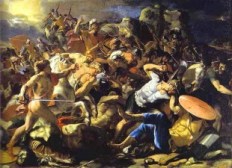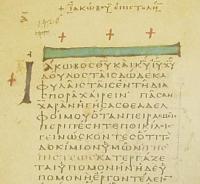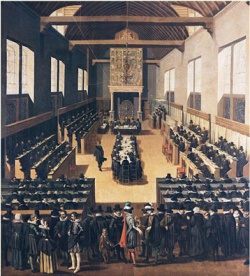 The Eighteenth in a Series of Sermons on Joshua
The Eighteenth in a Series of Sermons on Joshua
When Moses died, the people of Israel surely thought he could never be replaced. Years later when Joshua says farewell to his people, there can be no doubt that Joshua had shown himself to be a worthy successor to Moses. In fact, Joshua is a true biblical hero in every sense of the term. He was called by God to be covenant mediator. His leadership and skills as a general have been apparent throughout this book. But now as Joshua comes to the end of his life and says goodbye to the nation he has led, he will speak to the people of Israel and exhort them to remain faithful to the covenant God made with them at Mount Sinai. As he gives this speech to the leaders of Israel, Joshua sounds much like Jacob and Moses before him. Joshua is emphatic: The people of Israel must love their covenant LORD. They must do everything within them to obey God’s law. And they must never allow themselves to become enamored with the pagan religions of their Canaanite neighbors. If they obey their covenant Lord, the people of Israel will continue to receive God’s blessings. But if they deviate from God’s ways, they will come under the covenant curses.
We return to our series on the Book of Joshua. Lord willing, we will wrap up our study of Joshua next Sunday before turning our attention to the Book of Judges. As we have seen, Joshua is now an old man. It is his duty as covenant mediator to give a kind of “state of Israel” address before he goes to be with the LORD. The final two chapters of Joshua are exactly that–the covenant mediator’s words of blessing and warning of curse to his people. As emphatically as he can, Joshua reminds the people of Israel of the fundamental structure of their national covenant with YHWH. There are blessings for obedience and there are curses threatened for disobedience. If Israel obeys the covenant, they will remain in the land and they will continue to live in prosperity. But if Israel disobeys the covenant, the people risk being cast out of the land of Canaan and the LORD will withhold his blessing. Let Israel never forget that big figs and grapes, the blessing of many children, herds and flocks, as well as peace with their pagan neighbors are gifts from God and fruit of the nation’s obedience.
The biggest threat to Israel is not that an enemy will come and defeat them–although that will eventually come to pass. The biggest threat to Israel is that people will lose their love for YHWH, that they’ll be attracted to pagan “gods” and pagan forms of worship, and that they will cease obeying God’s law, thereby subjecting themselves to the covenant curses. In fact, by the time we get to Judges 2:11 we will read these sad words, “And the people of Israel did what was evil in the sight of the LORD and served the Baals.” Not only was Joshua about to die, but so were many of that generation living at the time of the conquest. It was the children of this generation who start Israel down the road toward unbelief, apostasy and ruin. The question about how we pass our faith on to our children, as well as how we remain faithful to God while surrounded by pagans, becomes the application we draw from here on out. It is one thing to capture the land and drive out the Canaanites, it is another to be faithful to God across the generations when there are so many temptations to worship and serve other gods and to marry outside the faith of Israel. This will be Israel’s struggle. It is also ours.
As Joshua gives these final words to Israel regarding the blessing-curse principle, and as he speaks about the future of Israel, his warnings are pointed and direct. The nation of Israel stands at another critical moment in its history. Those who hear Joshua’s words must choose what the future will hold for them, which is why it is so important that Joshua warn the people of the consequences of this critical decision. There are blessings to be received and there is the inevitability of covenant curse for disobedience.
Given the importance of this blessing/curse principle, I have been emphasizing two things in this series. First, the covenant God made with Israel at Mount Sinai, does not annual or replace the earlier covenant God made with Abraham. Confusing these covenants (the Abrahamic–the covenant of grace; and the Sinaitic–the works based covenant God made with as a nation) is a mistake that Jews will make later on, so that groups like the Judaizers see circumcision as not a sign and seal of the covenant of grace, but as something tied to the blessing/curse principle. The Judaizers believed that circumcision was meritorious and something we must do to be saved. On the contrary, in the Abrahamic covenant–the first historical manifestation of the covenant of grace–those who look to God in faith to provide for the forgiveness of their sins, will indeed be numbered among God’s people and receive their eternal inheritance. Through the eyes of faith they understand that the beauty and bounty of Canaan is but a faint glimpse of what awaits God’s people in heaven. But the covenant God made with Israel at Mount Sinai, however, is based upon the works principle and the people of Israel will be blessed or cursed as a nation, depending upon whether or not they are obedient to the covenant. The Sinaitic covenant is therefore, an entirely different kind of covenant than the Abrahamic covenant and we must keep them distinct.
The second thing I have been emphasizing is that the generation who entered the promised land under the leadership of Joshua, in a sense, serves as the high-water mark in terms of Israel’s faithfulness to the Lord. That generation which left Egypt complained about everything. They doubted that YHWH could keep his promise to give them the land of Canaan and to grant them victory over the Canaanites. Because of their unbelief, that generation was forced to wander throughout the Sinai desert for forty years. But the next generation, those born in the desert after Israel left Egypt, and who were living at the time of the Conquest and who entered Canaan with Joshua, they believed God could do as he promised. These were the people who renewed the covenant and were circumcised, who built an altar at Gilgal commemorating the crossing of the Jordan River, who celebrated the Passover in Canaan and who ate the produce of the land, instead of manna. These were the people who renewed the covenant at Shechem and who put Achen to death for violating God’s express command to not take anything from the ruins of Jericho. These are the people (and their children) to whom Joshua is speaking. But it is their children about whom we read in Judges, they “did not know the LORD or the work he had done for Israel.” Therefore, it falls to Joshua to warn Israel of the covenant curses, as well as point them ahead to the glories of what could be. Over time, Joshua’s message was forgotten and Israel will find itself coming under curse.
To read the rest of this sermon, click here
 Tuesday, September 9, 2008 at 08:08PM
Tuesday, September 9, 2008 at 08:08PM  Since it is now commonplace that evangelicals themselves can't tell us what they believe, why should we be surprised that Americans in general don't know what evangelicals believe. Why is there so much animosity toward them? Why do words like "idiot" and "nutcase" appear in the public's responses to questions about evangelicalism. Bill Hybels' and Rick Warren's theological chicks are now coming home to roost. Click
here: Americans have difficulty defining 'evangelical' (OneNewsNow.com)
Since it is now commonplace that evangelicals themselves can't tell us what they believe, why should we be surprised that Americans in general don't know what evangelicals believe. Why is there so much animosity toward them? Why do words like "idiot" and "nutcase" appear in the public's responses to questions about evangelicalism. Bill Hybels' and Rick Warren's theological chicks are now coming home to roost. Click
here: Americans have difficulty defining 'evangelical' (OneNewsNow.com)









